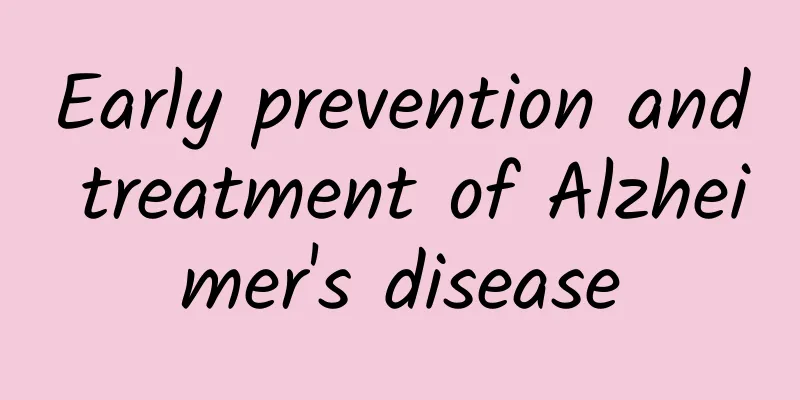Early prevention and treatment of Alzheimer's disease

|
More than 20 years before the onset of typical symptoms of Alzheimer's disease (AD), a series of pathophysiological changes occur in brain tissue. Mild cognitive impairment (MCI), also known as AD-induced MCI, that occurs during this process is the earliest stage with clinical symptoms. This stage becomes the most important window for early detection, diagnosis, and prevention of AD. Through history collection, physical examination, neuropsychological assessment, body fluid examination and imaging examination, AD-induced MCI can be diagnosed early and the following treatment plans can be started very early: Non-drug and drug treatments for AD-induced MCI 1. Recommendations for non-drug treatment: 1. Non-drug intervention is recommended for patients with AD-induced MCI, including cognitive training, moderate-intensity physical exercise, and a reasonable diet (such as the Mediterranean diet). 2. Repeated transcranial magnetic stimulation therapy helps improve patients' overall cognitive function, episodic memory and language function. 3. Computer-assisted cognitive training can serve as a useful supplement for intervention of AD-induced MCI. 4. Multimodal intervention consisting of multiple means such as diet, exercise, and cognitive training can improve or maintain the cognitive function of elderly people at high risk of AD in the population, and help delay the transformation of MCI to AD. 2. Recommendations for drug treatment: 1. The cholinesterase inhibitor donepezil can delay the progression of AD-induced MCI to AD in the early stages, but its long-term effects still need to be studied in more large-sample clinical trials. 2. Disease-modifying therapy with monoclonal antibodies targeting Aβ is likely to become an effective treatment for AD-induced MCI. 3. Drugs that reshape the balance of intestinal flora (such as sodium mannitol) can reduce peripheral related amino acid metabolites, alleviate brain neuroinflammation, improve cognitive function, and may have an improvement effect on AD-induced MCI. 4. Ginkgo leaf extract EGb761 improves AD cognitive function, but its effect on AD-induced MCI still requires large-sample clinical trials. 5. Patients with AD-derived MCI need to pay attention to emotional disorders (anxiety, depression, etc.) and deal with them in a timely manner, which may be beneficial in reducing the risk of MCI transforming into AD. Donepezil can delay the progression of AD-derived MCI with depression to AD. 6. Donepezil may be beneficial for patients with AD-induced MCI who have abnormal gait and are at risk of falling. 7. When using antipsychotic drugs to treat the neuropsychiatric symptoms of AD-induced MCI, the risk of causing cognitive decline must be weighed. ➤ Recommendations for medical staff and caregivers: 1. Medical staff should inform patients that combined intervention measures, including comprehensive management of risk factors, cognitive training, exercise therapy, home care, and social interaction therapy, are beneficial for preventing or delaying cognitive impairment. 2. Reasonable daily life care, environmental modification, care for caregivers and other measures are beneficial to improving the quality of life of patients and delaying the progression of cognitive impairment. ➤Prognosis and outcome recommendations: 1. The risk of AD-induced MCI patients converting to AD is significantly increased, and early diagnosis should be emphasized. 2. aMCI patients whose cognitive functions have returned to normal are still at risk of developing AD and require regular follow-up and evaluation (it is recommended to follow up and evaluate once every 3 to 6 months). 3. The application of biological markers (including body fluids and imaging) can more accurately assess the risk of AD-induced MCI patients converting to AD. Prevention of AD-induced MCI The prevention of AD-induced MCI is divided into primary prevention and secondary prevention. Primary prevention is to identify controllable risk factors for AD-induced MCI and reduce the risk to prevent the occurrence of MCI or the pathophysiological progression of AD-induced MCI; Secondary prevention is to detect pathological markers early and intervene in the preclinical stage of AD to prevent the transformation of MCI to AD. ➤ Recommendations: 1. Reasonable diet, regular physical and mental exercise, good sleep, blood pressure control, prevention and treatment of diabetes, cerebrovascular disease, atrial fibrillation, etc. are helpful in preventing AD-induced MCI. 2. Currently, there is no effective secondary prevention measure for AD-induced MCI. |
<<: Is it difficult to cooperate with MRI examination? Anesthesiologist can help you
Recommend
What food is good for breast enhancement?
For women, they all hope to have plump breasts, w...
What is the most effective way to remove spots and whiten the skin?
With the widespread use of computers and the cont...
Backache after ovulation may lead to pregnancy
Many friends believe that lower back pain after o...
Causes of hypoglycemia in girls
There are some symptoms and causes of hypoglycemi...
What is the concentration of baking soda for vaginal douche?
In the hot summer, many married women who have se...
Causes of menstrual pain
Dysmenorrhea is like hell for girls. When I have ...
Is ligation or IUD better?
For many women, after having given birth, in orde...
How to relieve urinary incontinence immediately for girls
The problem of incomplete urination is a very com...
The risk of cancer is more than 10% higher, and it is even more serious for those with cardiovascular disease. Obese people should pay attention!
Only those who are losing weight can understand t...
Best menopause period
As we all know, when women reach a certain age, t...
How to treat cervical separation
Cervical separation is a kind of cyst or is cause...
Causes of acne in 40-year-old women
Anyone can get acne, but teenagers are most likel...
How to treat pulpitis in pregnant women
Pregnant women are women who are pregnant. Pregna...
What is artificial insemination?
In order to help some infertile families, there i...
What are the complications of ovarian tumors?
The incidence of ovarian tumors is relatively hig...









